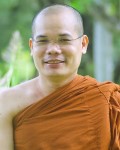2024
Jhubhur Chakma
- Doctoral Student
- Rajamangala University of Technology, Krungthep

Abstract
This project focuses on the ways that Theravada Buddhism is represented in Bangladesh—both in academic scholarship and by government agencies and other actors—in ways that homogenize religious identity and marginalize minorities. In particular, this dissertation critiques the distinction between Bengali Buddhism and tribal Buddhism, as there is a tendency to prioritize the former at the expense of the latter and to use religious classification to sanction the erasure of indigenous rights and identities. This dissertation documents how the various ethnicities in the Chittagong Hill Tracts of Bangladesh—the so-called tribal groups—have used their indigenous Jumma identity as a form of resistance to the assimilative practices of the Bengali majority in the country, creating a unique form of identity.

